Introduction
Family system theory is a specific theory that explains how a person can be identified using the criteria of relationship. It states that an individual can only be known well by looking at how he/she relates to one another in their various societies. For a family system to function effectively, it has basic principles that include good conduct and adhering to the instructions given. Individuals can demonstrate this by focusing their minds on specific roles. As a result, there are some patterns that are usually created among family individuals. Behavior is one of the patterns which results from individual behavior, and it may end up bringing some impacts on family members. Different patterns in a family system have a crucial impact; for instance, the behavioral patterns may result in a balance, or it may interfere with the normal functioning of a family. The paper will, therefore, address the three concepts of family systems theory that comprise emotional triangles, differentiation of self and nuclear family emotional progress with respect to personal family experiences.
Emotional Triangles
This concept is based on a relationship that usually occurs between three people. In most cases, people view this kind of concept to be unbalanced in that it takes time to involve another person whenever there is a conflict among them. Tension may also arise among the participants because of how they relate with each other. Also, this concept reflects how people's deeds are useful to others when it comes to how they resolve conflicts. As a student, this kind of concept has played a major role in achieving my success, especially when engaged in matters relating to the conflict. In such instances, I usually look for my close friends to help in handling the issue.
Differentiation of Self
This concept dwells on how different families vary in their ways of thinking, feelings, and more so how they act on matters affecting them. These variations are used to reflect one member of a family from another through the way they impact each other (Palombi, 2016). Also, differentiation of self is obtained after one's birth, and thereafter it cannot be altered during the course of a lifetime (Palombi, 2016). The differences that may arise at the individual's growth are how a person relates to one another in their various environments. After one has acquired this family concept, it will never be altered throughout his entire life.
Nuclear Family Emotional Progress
A nuclear family concept rather relies on some patterns, and its aim is to cope with problems that normally occur in various societies. For a nuclear concept to correlate with its patterns, attitudes, together with the beliefs of the people, must be included. Also, there are certain patterns that contribute to the relationship among the family members. Marital conflict is one the basic concept which is normally linked to the nuclear family concept. In this basic pattern, family members are considered to have some anxiousness amongst themselves, and therefore it can be spread from one person to another. Dysfunction of oneself is another basic principle when it comes to the handling of issues associated with nuclear family emotional progress. In this kind of concept, it emphasizes on pressures created by the two spouses. The pressures occur when one partner forces another spouse to behave in a particular manner.
Moreover, impairment of more than one child is also a basic principle in nuclear family progress (Cross, & Barnes, 2014). This situation involves an instance where people emphasize their worries on at least one child, and it is a vice versa because their children do worry about their parents. Parents can show worries about their children by seeing them in a negative manner, whereas children can demonstrate their anxieties towards them through thinking about how they are being viewed and the expectations from parents or even their guardians. Emotional distance is a basic concept which implies that family members cannot live without assistance from other people (Sutphin, McDonough, & Schrenkel, 2013). The concept is significant among the people because it creates good conduct between one person and another, thus leading to harmony in different societies.
References
Cross, D., & Barnes, A. (2014). Using systems theory to understand and respond to family influences on children's bullying behavior: Friendly Schools Friendly Families Program. Theory into Practice, 53(4), 293-299.
Palombi, M. (2016). Separations: A personal account of Bowen family systems theory. Australian and New Zealand Journal of Family Therapy, 37(3), 327-339.
Sutphin, S. T., McDonough, S., & Schrenkel, A. (2013). The role of formal theory in social work research: Formalizing family systems theory. Advances in Social Work, 14(2), 501-517.
Cite this page
Essay Example on Family System Theory: Understanding Relationships for Successful Functioning. (2023, Apr 09). Retrieved from https://proessays.net/essays/essay-example-on-family-system-theory-understanding-relationships-for-successful-functioning
If you are the original author of this essay and no longer wish to have it published on the ProEssays website, please click below to request its removal:
- The U.S Intelligence Community Relationship With Law Enforcement Agencies
- Female Gender Role Socialization: The Role of Biology and Socialization
- War Bonnet: Native American History Paper Example
- Sweatshops as One of the Main Unethical Practices by Global Businesses - Essay Sample
- Essay Example on Model Minority: 19th Century Chinese Immigration to US
- Essay Example on the Power of Dialogue: Exploring Communication Through Dialogue
- Effective Communication: The Key to Great Relationships - Free Essay Example







